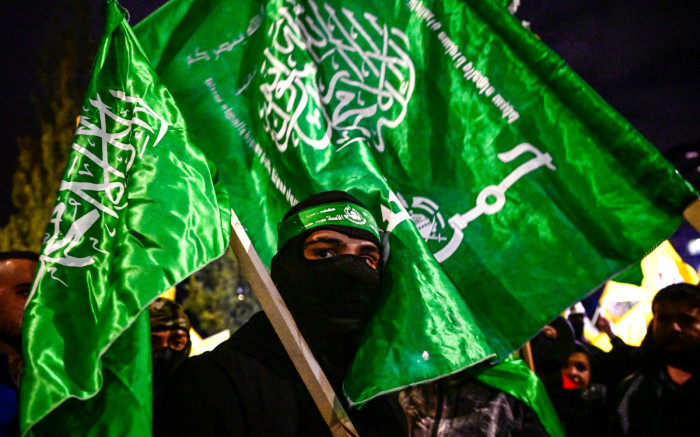
The findings are striking against the backdrop of protests and counter-protests sparked by the attack, with the relationship between Hamas and ordinary Gazans often the subject of heated debate.
A Palestinian holds Hamas flags as he waits for the release of prisoners in exchange for Israeli hostages held by Hamas in Ramallah in the occupied West Bank on November 27, 2023. Image: AFP
PRINCETON, United States — Many Gazans were hostile to Hamas before the group’s Oct. 7 attack on Israel, and some described its rule as a second occupation, according to rare survey data analyzed by an American-Palestinian researcher became.
The findings are striking against the backdrop of protests and counter-protests sparked by the attack, with the relationship between Hamas and ordinary Gazans often the subject of heated debate.
“We found in our surveys that 67% of Palestinians in Gaza had little or no trust in Hamas in the period immediately before the attacks,” said Amaney Jamal, dean of Princeton’s School of Public and International Affairs.
“This is particularly important because [erroneous] Argument that all of Gaza supports Hamas and therefore all of Gaza should be held accountable for the actions, the cruel actions, of Hamas.”
Jamal is one of the driving forces behind the Arab Barometer, which conducts surveys and polls in the region, including in Gaza, where fieldwork was completed on the eve of the attacks on Israel.
She said Hamas, which won elections in the Palestinian territories in 2006 and is classified as a “terrorist” organization by Washington and the EU, was viewed by many respondents as “corrupt” and “authoritarian.”
“75 percent said in the last 30 days that they could not afford to feed their households. So it’s again an impoverished society, a society that basically says that the Hamas-led government has a certain level of corruption,” Jamal said.
“Peaceful Reconciliation”
“When we ask people: Who do you blame? …we thought that the main culprit would be Israel because of the blockade. But most people pointed more to Hamas’ corruption than the Israel blockade.”
Jamal, 52, who was born in California and grew up in her family’s hometown of Ramallah, said there was also a sense that “the Palestinian Authority or the Hamas-led government has become more dictatorial – and more authoritarian” over time.
“For the average Palestinian in the West Bank or Gaza Strip [they say] “We have that.” [Israeli] Occupation and then we have these Palestinian governments that are also authoritarian. So a common saying goes: “We used to be employed by one power, now we are employed by two.”
The latest Arab Barometer was conducted from late September to October 6 in Gaza, where 399 people were surveyed, and in the West Bank, where 790 people were surveyed. The results were published in the journal Foreign Affairs.
“About 60% said that on the eve of the attacks they believed they could not express their opinions freely and openly [and] “About 72% said they could not peacefully protest against the Hamas-led government,” Jamal said. “There was fear of retaliation or retaliation from the government.”
President Mahmoud Abbas’s Palestinian Authority, which administers the Palestinian territories in the West Bank, fared poorly in Jamal’s survey, with only 9% of responses positive.
Despite the majority negative opinion of Hamas that Jamal’s research uncovered, the report warns that perceptions may have changed following Hamas’ attack on Israel.
“Israel cut off water, food, fuel and electricity supplies to Gaza following the October 7 attacks, plunging the territory into a severe humanitarian crisis…The suffering experienced by Palestinians has likely hardened their attitudes,” it said it.
In the run-up to the attacks on Israel, more than half of those surveyed were in favor of a two-state solution – a Palestinian state alongside Israel.
The rest opted for either a Palestinian-Israeli confederation or a one-state solution. But one in five supported armed resistance before the events of October 7 and the massive Israeli military response that followed.
“[Gazans were] “Open to peaceful reconciliation with Israel based on the 1967 borders,” Jamal said.






Recent Comments